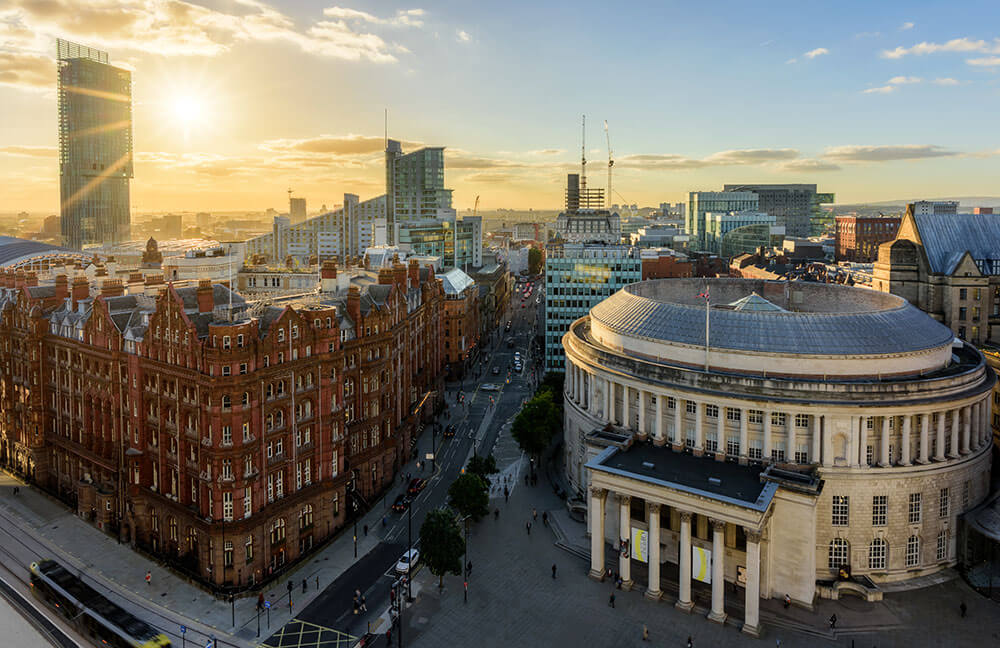
Manchester, the world’s first industrial city, is being rejuvenated. (Marketing Manchester)
When I flew from New York City’s JFK airport to Manchester in northwest England for a press trip in late October, my direct flight was nearly an hour early and I arrived, sleepily, into pre-dawn darkness. I didn’t see much during the 20-minute cab ride from the airport into the city.
My luck changed upon checking into the five-star Edwardian Manchester in central Manchester, which was a feast for the eyes. The Edwardian, part of the Radisson Collection, is built in what was the city’s Free Trade Hall; behind its 1853 gray sandstone façade, the hotel recently underwent a luxurious renovation, which included its dining, lobby, and meeting spaces, the spa, and 263 guest rooms. After a big breakfast in the bright Peter Street Kitchen — which melds Japanese and Mexican cuisines, although not on the breakfast buffet — I went to my room for a nap.
Refreshed, I joined members of the Marketing Manchester team, Convene’s host, and the rest of our group, press from the U.K. and Belgium, to walk across the street to another iconic building, once the Manchester Central Railway Station, and now home to the Manchester Central Convention Complex. The structure was the city’s main railway station between 1880 and 1969, and still retains its Victorian-era architectural bones, with vaulted arches and station clock. Inside, the space offers modern, flexible meeting and exhibitions space, including the 10,000-square-meter Central Hall — originally the train shed — and multiple meeting rooms, an 804-person auditorium, and business lounge. The center has four separate entrances, and, although we were there on the final day of the IEEE Nuclear Science Symposium and Medical Imaging Conference, there was plenty of room in the building for another conference group or two.
Over lunch in a sunny meeting room, Nick Brooks-Sykes, director of tourism for Marketing Manchester, gave us an overview of what the city has to offer as a meeting destination, including easy access by air and rail; a walkable city center with more than 2,500 rooms adjacent to the convention center campus; and a vibrant and expanding dining and entertainment scene.
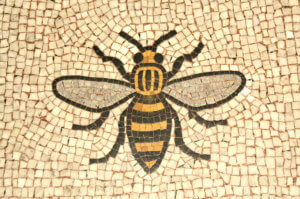
The symbol for Manchester is the worker bee, an apt description of the world’s first industrialized city that is now remaking itself.
Even so, there is a lot of competition for business tourism, Brooks-Sykes said, and one of the things that sets Manchester apart is its ability to offer convention delegates opportunities to engage with local scientists, and business and thought leaders in the city. During the 19th century, thanks to the combination of steam-powered railroads and textile mills, Manchester became famous as the world’s first industrialized city — the city’s symbol is a worker bee. After declining in the latter part of the 20th century, Manchester now is one of the fastest-growing cities in Europe and is in renaissance mode, humming with breakthroughs in life sciences and advanced material manufacturing, and apartments, and creative and tech industries are filling up what once were abandoned factories and warehouses.
After lunch, we got a crash course in Manchester’s history with a walking tour of the city center. Our first stop was just outside the convention center, where a monument installed recently commemorates the 200th anniversary of the Peterloo Massacre, when 60,000 protesters were attacked by government armed forces — 18 people were killed and 700 were injured. The backlash against the peaceful protests set democratic reforms in motion, our tour guide Emma Fox told us. Manchester has long led social change, giving birth to both the trade-union and women’s suffrage movements.
The British suffragette Emmeline Pankhurst was thrown out of the Free Trade Hall, Fox added, a venue where Charles Dickens, Sid Vicious of the Sex Pistols, and the Dalai Lama all later made historic appearances before it was turned into a hotel.
Manchester is a UNESCO City of Literature, and one of the highlights of the walking tour was the church-like John Rylands Library, filled with Gothic arches and stained glass, a gift to the city from the widow of a cotton magnate, and the Manchester Cathedral, the earliest parts of which date back to the 14th century. We also peeked through the gate at Chetham’s Library, the oldest public library in the English-speaking world — in continuous use for more than 350 years. Another highlight: The Royal Exchange Building, once the largest commodity trading hall in England, and cavernous enough to accommodate Royal Exchange Theatre, and a lively mix of shops and restaurants.
After circling the city center on foot, we got a look at the big picture at 20 Stories, a rooftop bar and restaurant, where the lights of the city spread out below us, and where we spotted a few dozen construction cranes that have become part of Manchester’s skyline — the official count the week we were there was 64.
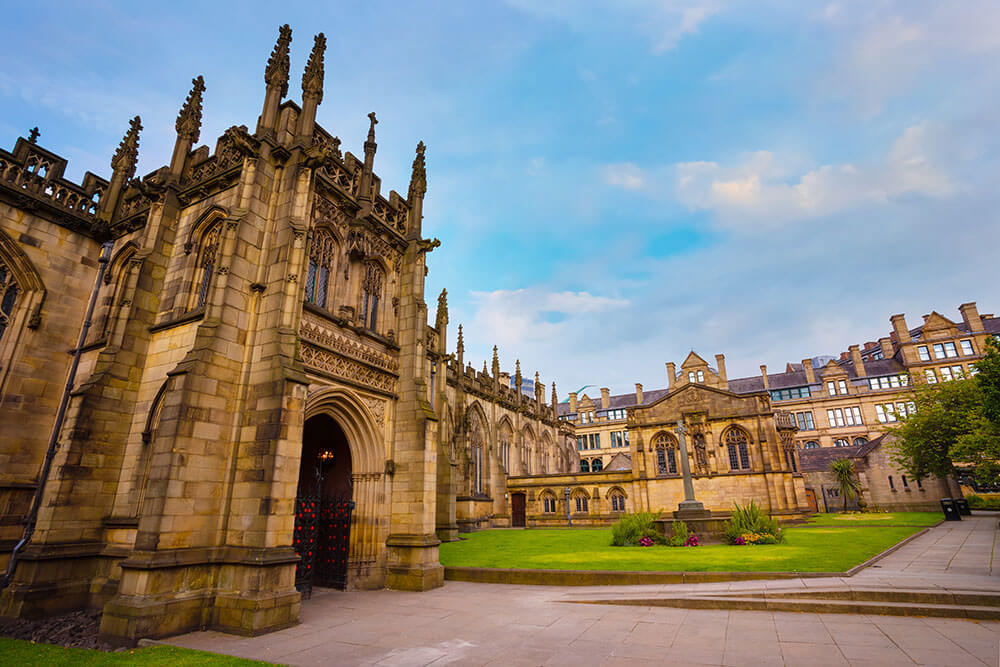
One of the highlights of a walking tour was the Manchester Cathedral, the earliest parts of which date back to the 14th century.
More Than Academic
Manchester’s universities have a high profile in the city — some of world’s leading thinkers and scientists have been associated with the University of Manchester, including Alan Turing, a pioneer in computing and artificial intelligence. The picturesque campus is a blend of historic red-tile-roofed, sandstone buildings and modern facilities, including auditoriums and meeting rooms that can accommodate up to 1,000 conference attendees. The University of Manchester also offers venues for special events, including the Manchester Museum, where dinner can be served beneath a remarkably fearsome cast of a Tyrannosaurus rex fossil.
We stopped for lunch at the book-filled, wood-paneled Christie’s Bistro, formerly a library, which can be used for dinners and receptions. Just steps away, through a short passageway, was Whitworth Hall. With its vaulted ceilings and pipe organ, it’s an impressive space that can accommodate up to 675 people theater-style or 300 people for dinner.
Just a 15-minute walk away is Manchester Metropolitan University — “Man Met” to locals — which is known for both its business and arts programs and its leadership role in sustainability. Man Met also offers meeting space for groups. Manchester proved to be a particularly good fit for the International Gothic Association Conference in 2018, said James Charnock, the sales and marketing officer for the university’s conferences and events, thanks in part to the city’s wealth of Gothic architecture and the university’s strong Gothic writing program. The university offers innovative, interactive food-related programs, with an emphasis on sustainability, through its catering services team.
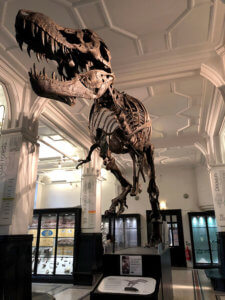
The T-rex at Manchester Museum is called Stan. (Barbara Palmer)
We stopped for a late-afternoon drink at The Principal, a turreted hotel that is notable for its ornate architecture, even in a city brimming over with it. The 270-room hotel, now part of the Kimpton brand, was converted from the landmark Refuge Assurance Building, a life insurance and pensions company. Amid what seemed like endless acres of red brick and terra cotta in the center of the building, we found “The Refuge,” a restaurant, bar, and meeting place that was designed by a pair of local DJs. It turned out to be one of the coziest stops on our tour.
That evening, we went back to the Manchester Central, where the Spirit of Manchester Distillery — a combined gin distillery, cocktail bar, and restaurant — was built within the old train station’s six, red-brick railway arches, and sits below the new event venue at street level. It was opened by a couple who founded Manchester Gin and got their start by distilling artisanal gin in a corner of their dining room. Before dinner, we took part in a gin-making master class, selecting botanicals with which to infuse a bottle of spirits. (I went with a blend of grapefruit, ground almond, and dandelion root.)
After a full two days in Manchester, we had yet to need to travel by car or bus, but if we had wanted to use it, a free hop-on, hop-off bus circles the city. The next morning, though, we did set out by taxi, first to Manchester’s arguably oldest spot, Castlefield, where there are recreations of a Roman settlement that has been traced back to 79 A.D.
We also stopped by a popular culture icon — Salford Lads Club on Coronation Street. The still-active club, founded in 1903, reached international fame after it served as backdrop for an album cover for the Manchester band, The Smiths.
RELATED: MetMUnch Shows It”s Okay to Play With Your Food
From there we headed to another shrine, the Old Trafford, home stadium for the Manchester United Football Club. It wasn’t a game day, but the stadium had heavy foot traffic nonetheless, with fans from all over the world who came to tour the stadium and a museum dedicated to the club. Lunch was at Mackie Mayor — a brick-walled food hall built in what was former meat market, which was buzzing on a Saturday afternoon, and where we ate at communal tables under a glass roof. The food hall is in the city’s slightly gritty, art-filled Northern Quarter, where I took advantage of a few free hours to poke my head into some shops.
Our final dinner, at the recently opened Bistroteque restaurant at CULTUREPLEX in the Northern Quarter, struck me as an inspired way to sum up the Manchester experience of new ideas remaking a historic setting. The new venue, which opened last fall in what was once an industrial warehouse, describes itself as a “cultural experiment,” and a community center for a modern city. There are spaces to work, take classes, watch films, and, as we did, gather around a table over a good meal and good conversation.
Barbara Palmer is deputy editor of Convene.
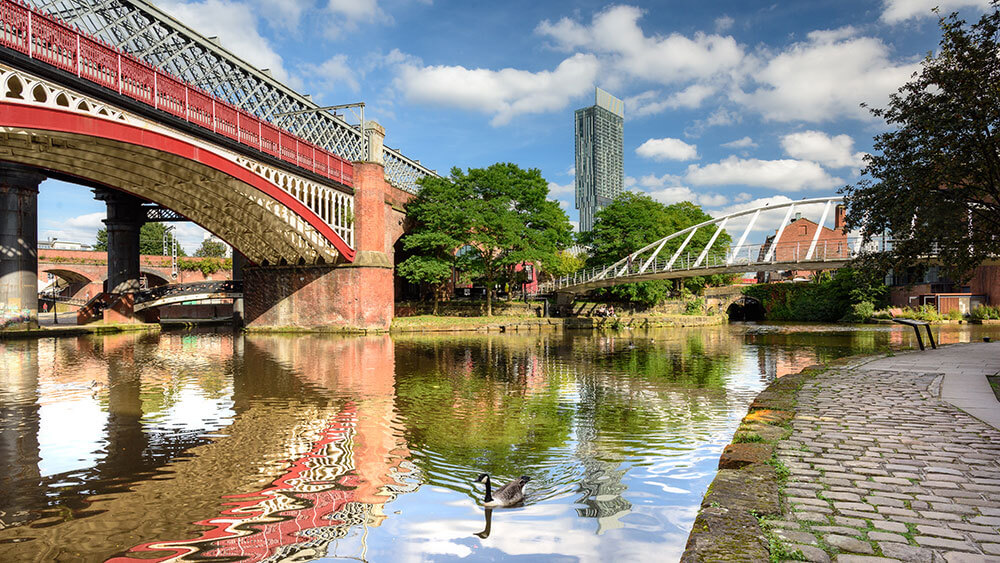
Once the city’s industrial arteries, Manchester’s canals are now leisure hotspots. Castlefield Basin, shown here, is one of the oldest parts of the city dating to Roman times.(Marketing Manchester)
